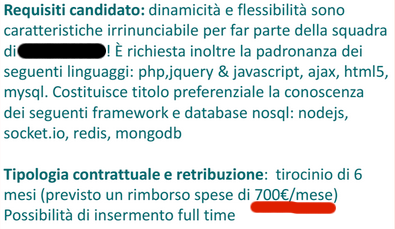Business models, working hours and the crazy ICT in Italy
This week the trending topics were the #sharingeconomy and the fact that now Uber is illegal in Italy.
Personally I don’t like the term “sharing economy”, it’s just economy or probably Fluid Economy. The main difference is that you provide a service person to person and you get money from that. In Italy the salaries, especially for software engineers, are incredibly low (about half the salary of France or Germany) and a reason for that is that often their work isn’t understood.
The italian government spent 45M€ for Italia.it a touristic portal, but most of time the money goes to events, promotions, consultancies, instead of doing things. And this behavior often is present in italian startups. Very catchy video presentations and weak MVC/Prototypes or boring presentations with random numbers about how fast the mobile usage is growing.
Business model
I think we can stop to create pointless analysis and creative revenue streams.
The success companies always apply a known pattern or mix, then you have to launch to prove that your business is sustainable.
- contextual or direct advertising: if you have a vertical niche you can direct sell ads, otherwise you need to use Google AdSense or if you know well your users you can generate your contextual ads (Facebook, Twitter).
- marketplace: you solve a common problem and resell your platform for a monthly subscription or a transaction fee.
- transaction fee: you earn a fee for every transaction.
- freemium / monthly subscription: you release a service for free and earn from your premium features or heavily user usage.
- one time selling: Nothing to say. You earn from your direct sell of your physical or digital product
Working hours
Another hot topic in this Economy 2.0 are the working hours, 9to5, 9to6, 8 hours 5 days a week and so on.
Let’s be explicit, not all jobs are the same. Virgin, Netflix, use more flexible working hours, because they allow remote working, in Italy remote working is very rare because most of the times who coordinate you isn’t able to evaluate what you produce.
Flexible working hours are fine for creative jobs, but of course aren’t ideal for repetitive
jobs where you produce proportionally to the time you spend at work.
The job offer
Another crazy thing about Italy is that most of job offers doesn’t disclose the salary for the position and who does it put a very embarrassing price.

But the craziest part of the situation is that italian companies lament that can’t find ICT experts and still refuse remote working…
I think the other european companies or startup should take advantage of this situation and hire remotely italian software engineers, developers and the italian ICT experts should stop to work for such companies :)